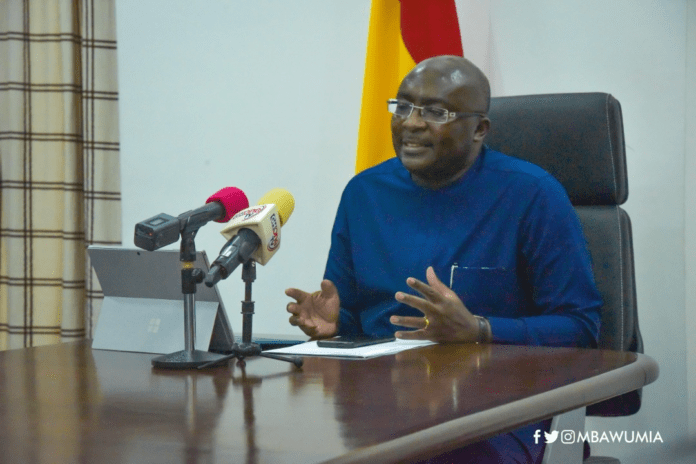The cost of one interchange under the erstwhile John Dramani Mahama administration is the cost of four interchanges under the Akufo-Addo administration, Vice President Dr Mahamudu Bawumia, has said.
Speaking at a ‘Town Hall’ meeting on Tuesday, August 18, he said this clearly shows that the New Patriotic Party (NPP) administration has been prudent with the little resource at its disposal, thereby, doing more infrastructure projects than the previous administration.
The Vice President cited the ongoing Tema, Pokuase and Obetsebi Lamptey interchanges in the Greater Accra Region and the ongoing Tamale interchange in the Northern Region all of which he indicated are at a total cost of “$289million” compared to the “$260million” Kwame Nkrumah interchange and asked the electorate to “ponder” that.
He claimed that for the eight years that the National Democratic Congress (NDC) was in power, it could not complete one major road in erstwhile three regions in north Ghana, namely Upper West Region, Upper East Region and Northern Region.
But, the Akufo-Addo administration in the first-term has constructed at least one major road in those regions.
Prior to the 2016 elections, John Dramani Mahama commissioned a redesigned Kwame Nkrumah Circle interchange to ease the heavy vehicular traffic in the capital.
Dubbed the ‘Dubai interchange’, Ghana’s first-ever three-tier interchange included a 1.2km flyover from the then Busy Internet end of Ring Road Central to the Awudome Cemetery, near the Obetsebi-Lamptey Roundabout with street lights, and a Kwame Nkrumah park.
Phase one of the project cost €74 million whilst phase two was done at US$170 million.
In 2019, President Akufo-Addo cut the sword for the redevelopment of the Obetsebi Lamptey Circle into an interchange at a reported $39million for phase one and $100million for phase two.
This project is far from what anybody can describe as even nearing completion.
In short, the cost of a completed project cannot be compared to the cost of an ongoing project; only projected estimates can be discussed.
And yet when we as journalists hold the feet of politicians to the fire, our own colleagues chide us and tell us to look out for something positive to say about so that the general public will see us as “neutral and balanced”.
In Ghana, road projects take longer to complete, and costs can escalate especially when the project delays, which is often the case.
The $39million phase one component of the project is being undertaken with a loan from HSBC, which was secured under the Mahama administration and approved by Parliament in August 2016, four months to Mahama’s leaving office.
The opposition NDC are expected to contest these four-at-the-cost-of-one claims.
But sadly neutral observers must keep quiet; they must not express an opinion; logic, the natural human inkling that enables all humankind to arrive closer to the truth must not be aroused in the ways of a “journalist and political junkie”.
The Tamale interchange project, with side roads, covering a total length of one-kilometre is the first-ever in the Northern Region.
This is being constructed as part of the projects funded through the $2billion Government of Ghana and Sinohydro Master Project Support Agreement.
The Vice President’s claims will, therefore, require verification and further clarification, and this will require audits of payments made, which are most reliably obtained from the Public Accounts Committee of Parliament – long after the fact.
The much talked about four-tier $65million Pokuase Interchange project in the Ga West Municipality of the Greater Accra Region – with viral social media pictures – covers five-kilometres, comprising the two-kilometre Awoshie-Pokuase portion, the two-kilometre Accra-Nsawam portion and also and the Kwabenya portion of the project.
It is not clear whether Dr Bawumia is saying all these components which are being circulated on social media, cost the figures he mentioned. In Ghana, road projects typically involve compensation for the demolition of buildings or loss of business.
These are sometimes aggregated into the cost of the project; sometimes they are separated for political expediency.
It is only when the Freedom of Information Act (FOI), passed in 2019, after 20 long years, is implemented, that the electorate and the media can verify and authenticate such details.
The FOI was passed by Parliament, and President Akufo-Addo gave it presidential assent, yes, under this NPP administration.
This is a fact which this “political junkie of a journalist” must praise while conveniently forgetting that the NPP was in power for eight years during which they ignored the bill, introduced in Parliament when a certain John Mahama was Minister for Communications (with additional portfolio for Information).
The said John Mahama became Vice President and President of Ghana for eight years during which he failed to get the FOI passed. Serves him right when Bawumia does his contorted Bawumian analysis and keeps us groping in the dark, doesn’t it?
For now, the costs and comparisons will be kicked about in the typical political football that Ghanaian politicians play…..and the media will be blamed for not fact-checking like their colleagues do in America and elsewhere.
We, in the media and the electorate – no, all of us taxpayers, are the only losers here.
The author is a journalist, communications and media analyst and a writer. The views expressed are solely his and does not represent the organisation he works for.
Email: paanyan7@gmail.com
Blog: ekowrites.blogspot.com
Twitter: @eArthurAidoo

